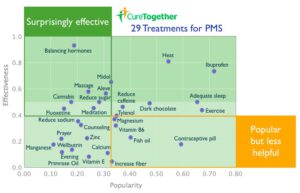
By Alexandra Carmichael, Co-Founder of CureTogether
Some of the most effective treatments for women with symptoms from Premenstrual Syndrome (PMS), are also some of the simplest. CureTogether – a free resource owned by 23andMe that allows people to share information about their health and treatments – surveyed more than 1,000 women who reported having PMS who reported that interventions such as heat, Ibuprofen, massage, extra sleep, and even eating dark chocolate helped.

For the live-updated, fully-labelled, interactive version of this infographic, click here.
Symptoms for PMS can include both emotional and physical distress and range from mild to more severe and can sometimes interfere with day-to-day activities. Participants in the study said they found that over-the-counter pain relievers, heat from hot pads or a bath, and relaxing activities like massage and meditation were among the most effective treatments. The survey also found that exercise and some drugs like Cannabis and Fluoxetine helped some women. Conversely, some common treatments such as contraceptive pills, fish oil, and calcium were among the least effective, according to the study.
The American College of Obstetricians and Gynecologists estimates that at least 85 percent of menstruating women have at least 1 PMS symptom as part of their monthly cycle. It can be painful and embarrassing to talk about, and finding accurate recommendations on treatments that work well can be challenging, so CureTogether asked women who experience PMS to rate the effectiveness of 29 different patient-reported treatments.
Most Effective Rated Treatments for PMS
1. Balancing hormones
2. Heat
3. Ibuprofen
4. Midol
5. Massage
6. Aleve
7. Cannabis
8. Reduce sugar
9. Adequate sleep
10. Dark chocolate
Where did this data come from? This is the result of a four-year CureTogether study on PMS, in which 1,179 women shared information about their symptoms and what treatments worked best for them. We’d like to thank those who participated. And just as they shared their experience with treatments, we’re freely and openly sharing the results of the PMS study.
This is part of a regular series of CureTogether research findings. CureTogether’s research findings are different than those made by 23andMe, which look at genetic associations with illness, traits and drug response. But as we continue our work with the CureTogether community, 23andMe hopes to incorporate more of this kind of self-reported information into our own research. CureTogether present its findings just as they are – patient-reported data – to stimulate discussion and generate new insights for further research.
Please tweet, blog, or pass this along to anyone who can benefit or is interested in PMS. Thank you!